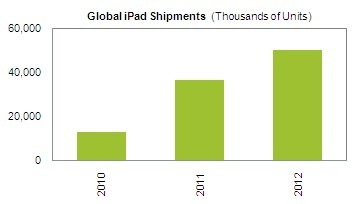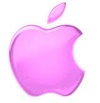Amid indications that Apple Inc. is ratcheting up its iPad production targets to meet booming demand, iSuppli Corp. (http://www.isuppli.com) is ratcheting up its shipment forecast as well.
iSuppli now predicts Apple will ship 12.9 million iPads in 2010, an increase from the previous forecast issued April 2 of 7.1 million units. Shipments will rise to 36.5 million in 2011 and 50.4 million in 2012, predicts the research group.
“The iPad is shaping up to be the ‘Tickle Me Elmo’ of the 2010 holiday season, with product demand expected to vastly exceed available supply,” says Rhoda Alexander, director of monitor research for iSuppli. “Apple has hiked its iPad manufacturing goals to suppliers across Asia. As iSuppli stated in its initial forecast, the key to continuing success will be how quickly Apple responds to issues as they arise and whether the company can align suppliers to meet demand needs. Apple’s acceleration of its component demand indicates that the company has raised its iPad production target for 2010. Our latest research indicates there is much higher production than previously expected for two key components: LCD panels and NAND flash.”
iSuppli’s original iPad forecast was by far the most aggressive outlook for the product among industry analysis and market research firms issuing outlooks at the time. iSuppli in April characterized its forecast as conservative, and noted that Apple could easily ship higher volumes. Subsequent events have shown iSuppli’s characterization to be correct.
“iSuppli believes that the only limitation on iPad sales now is production—and not demand,” Alexander says. “Apple has taken a very controlled approach introducing this product to new markets, with manufacturing limitations likely being the major inhibitor on how quickly iPad sales expand.”
iSuppli’s believes that Apple can hit the new unit sales figure within the 19 countries it has already announced for 2010 distribution. Production capacity for the iPad’s projective capacitive screen is increasing daily with new vendors entering the market, expanding production at existing sites and improvements in yield rates at the established producers.
While yields on the finished screens reportedly remain well below a desirable level of 90% the expansion in capacity should provide sufficient touch panels to meet iSuppli’s iPad shipment target. Arguably, Apple could further increase its 2010 production goals, but it risks sacrificing some quality control in that effort. At present, iSuppli estimates Apple will stay close to the existing production targets, leaving room for further expansion in 2011.
To drive continued sales growth, Apple undoubtedly will refresh the iPad’s features in April 2011, says iSuppli. Likely additional changes will embrace an internal camera and expansion of the product line, potentially including additional screen sizes.
Nonetheless, with nearly 84% share in 2010, Apple’s iPad virtually owns the market, and the device is expected to dominate at least through 2012. In comparison, much of the competition delayed launching rival offerings following the iPad debut to allow time to reconfigure products.
For their part, Asus and Acer are expected to release consumption tablets in the fourth quarter of 2010 — joining the likes of Dell, JooJoo, and Germany’s WePad — but competition from Apple competitors is not expected to be significant before 2011, when Hewlett-Packard and others are expected to enter the fray, says iSupplie.
To be sure, the major challenge for Apple competitors will revolve less around hardware but relate more to the suite of applications that can be paired with the hardware, adds the research group. Just like the iPhone, the rest of the market is feverishly playing catch-up to the iPad at this point.



